If you're curious about surveillance's history, I've found some fascinating books that uncover its secrets. *Surveillance Valley* traces the internet's military roots, while *Verax* offers a unique look at whistleblowing and monitoring through a graphic novel lens. *The Age of Surveillance Capitalism* critiques how tech giants exploit personal data, and *Creditworthy* covers consumer surveillance's evolution. These titles, among others, provide deep insights into monitoring systems. Stick around to discover more impactful reads!
Surveillance Valley: The Secret Military History of the Internet
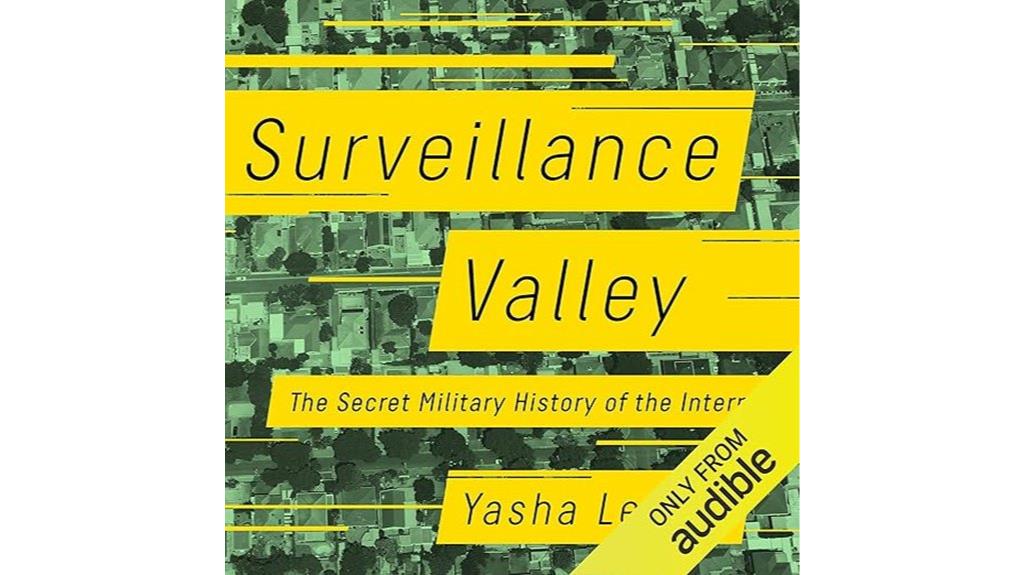
If you're someone who's deeply concerned about privacy and the implications of our digital interactions, then Yasha Levine's "Surveillance Valley: The Secret Military History of the Internet" is an essential read for you. Levine reveals that the internet's roots are deeply intertwined with military intentions, starting from ARPANET. He challenges the myth of the internet as a free space, exposing its role in surveillance and social control. By connecting wealthy tech moguls to intelligence agencies, he shows how our digital lives are monitored. This book is a wake-up call about the reality of our online interactions and the pervasive surveillance state we live in.
Best For: Individuals concerned about privacy, digital surveillance, and the implications of technology on society.
Pros:
- In-depth historical analysis of the internet's military origins and its evolution into a surveillance tool.
- Challenges common misconceptions about user privacy and the true nature of influential tech companies.
- Encourages critical thinking about the implications of technological advancements and the need for awareness.
Cons:
- May be unsettling for readers who prefer to view technology as a purely positive force.
- Dense content that may require careful reading to fully grasp the complexities presented.
- Potential bias in presenting the relationship between technology and surveillance, as it focuses heavily on military connections.
Verax: The True History of Whistleblowers, Drone Warfare, and Mass Surveillance Graphic Novel
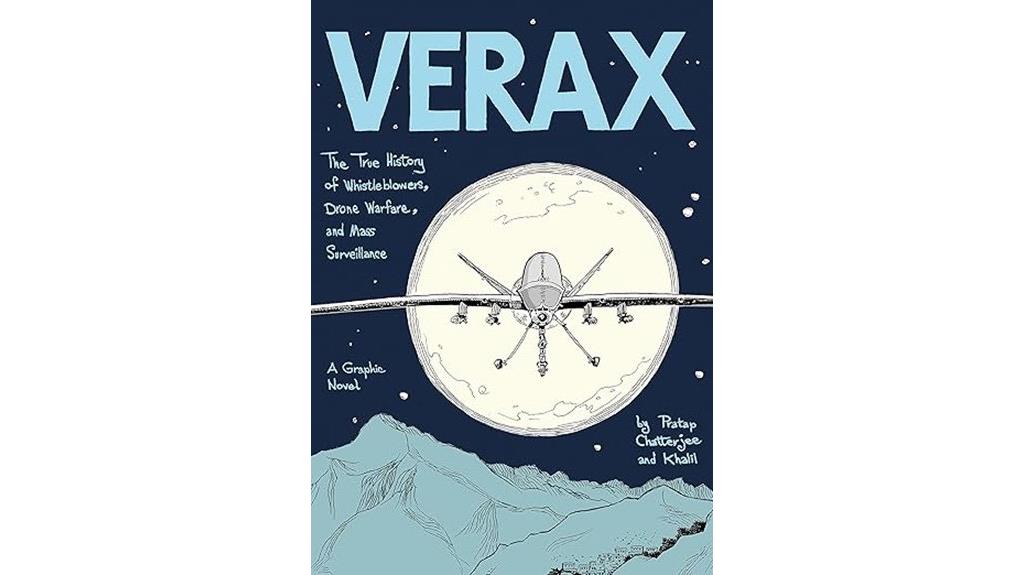
"Verax: The True History of Whistleblowers, Drone Warfare, and Mass Surveillance" stands out as an essential read for anyone enthusiastic to understand the complexities of modern surveillance. This graphic novel by Pratap Chatterjee, illustrated by Khalil Bendib, brilliantly explores the intricacies of government monitoring and the implications of whistleblowing, particularly through Edward Snowden's revelations. I found the writing clear and engaging, complemented by distinctive caricature-style illustrations that keep you hooked. While some sections investigate deeper than others, the overall narrative effectively raises awareness about the pressing issues surrounding surveillance today. It's a thought-provoking read that shouldn't be missed.
Best For: Readers interested in understanding modern surveillance issues and the implications of whistleblowing in an engaging graphic novel format.
Pros:
- Well-researched content that effectively raises awareness about government surveillance and drone warfare.
- Clear and engaging writing style that makes complex topics accessible to a wide audience.
- Distinctive caricature-style illustrations that enhance the storytelling and maintain reader interest.
Cons:
- Some readers may find certain sections less compelling than others, particularly regarding drone warfare.
- A desire for more depth and historical context may leave some readers wanting additional background information.
- The art style may not appeal to everyone, with some considering it garish rather than visually appealing.
The Age of Surveillance Capitalism: The Fight for a Human Future

For anyone concerned about the future of privacy and democracy in our increasingly digital world, "The Age of Surveillance Capitalism" by Shoshana Zuboff is an essential read. Zuboff sheds light on how companies like Google and Facebook commoditize our personal data, shifting from serving users to exploiting us for profit. She warns that this surveillance culture threatens our individual freedoms and civic responsibilities, leading to greater inequality. I found her insights compelling, as they challenge us to reflect on our roles in a society shaped by technology. This book is a wake-up call to protect our privacy and democratic values.
Best For: Individuals and policymakers concerned about the implications of digital technology on privacy, democracy, and societal values.
Pros:
- Provides a thorough analysis of how surveillance capitalism impacts personal freedoms and civic responsibilities.
- Offers a compelling narrative that encourages readers to reflect on their roles in a technology-driven society.
- Highlights the urgent need for action and legislation to protect privacy and democratic values.
Cons:
- Some critiques argue that the book oversimplifies complex economic issues related to surveillance practices.
- The focus on ideology may overshadow the practical challenges of balancing technology with privacy rights.
- Critics suggest that the threats posed by a surveillance state, particularly in countries like China, are more immediate than the economic implications discussed.
Creditworthy: A History of Consumer Surveillance and Financial Identity in America

"Creditworthy: A History of Consumer Surveillance and Financial Identity in America" is a compelling read for anyone curious about the intricate relationship between consumer data and financial identity. Josh Lauer meticulously traces the evolution of credit reporting bureaus, revealing how they shifted from numerous providers to just a few giants like Equifax. The book highlights our growing acceptance of data sharing, yet raises critical concerns about privacy and the exploitation of personal information. With the recent Equifax breach fresh in mind, Lauer's insights remind us of the urgent need for regulation in consumer data practices. This book is a must-read for understanding financial identity today.
Best For: Readers interested in understanding the historical context and implications of consumer credit and surveillance practices.
Pros:
- In-depth historical analysis: The book provides a comprehensive look at the evolution of credit reporting bureaus over time.
- Relevance to current issues: It addresses contemporary concerns about data privacy and the security of consumer information, especially in light of recent data breaches.
- Educational resource: "Creditworthy" serves as a valuable tool for those looking to grasp the complexities of credit scoring and its impact on financial identity.
Cons:
- Academic language: Some readers may find the book's academic tone off-putting or difficult to navigate.
- Focus on historical context: The book glosses over more recent developments in credit reporting, which may leave some readers wanting more current information.
- Limited accessibility: The depth of research and analysis may not appeal to casual readers or those unfamiliar with the topic.
Handbook of Surveillance Technologies
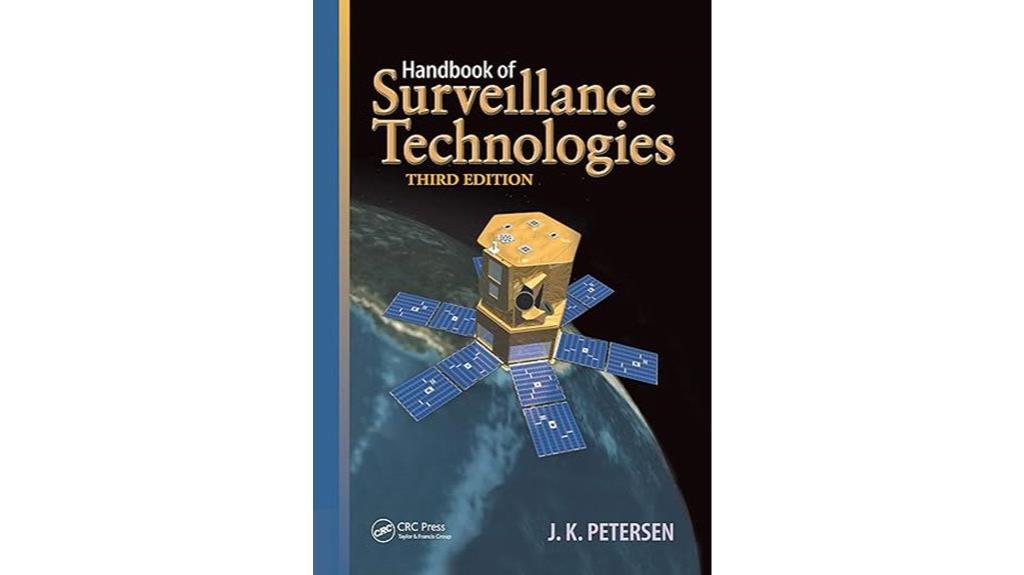
The "Handbook of Surveillance Technologies" serves as an essential resource for professionals like journalists and privacy advocates who seek a deeper understanding of the evolution and historical context of surveillance methods. It's required reading at Henley-Putnam University and offers an extensive reference without delving into technical engineering details. Instead, it compiles original patents, white papers, and government documents, correcting past inaccuracies about inventions like the telephone and radar. This handbook is perfect for anyone interested in surveillance's background and regulations, though it's heavy and not meant for easy transport. It's invaluable for foundational knowledge in this ever-evolving field.
Best For: Journalists, privacy advocates, and professionals interested in the evolution and historical context of surveillance technologies.
Pros:
- Compiles original patents and government documents, providing accurate historical context.
- Serves as a comprehensive reference for understanding surveillance regulations and trends.
- Valuable for foundational knowledge without delving into technical engineering specifics.
Cons:
- Heavy and not designed for easy transport, making it cumbersome for classroom use.
- Does not include technical details for designing or building surveillance hardware.
- May not satisfy those seeking in-depth engineering or construction information.
U.S. Army Reconnaissance and Surveillance Handbook (US Army Survival)
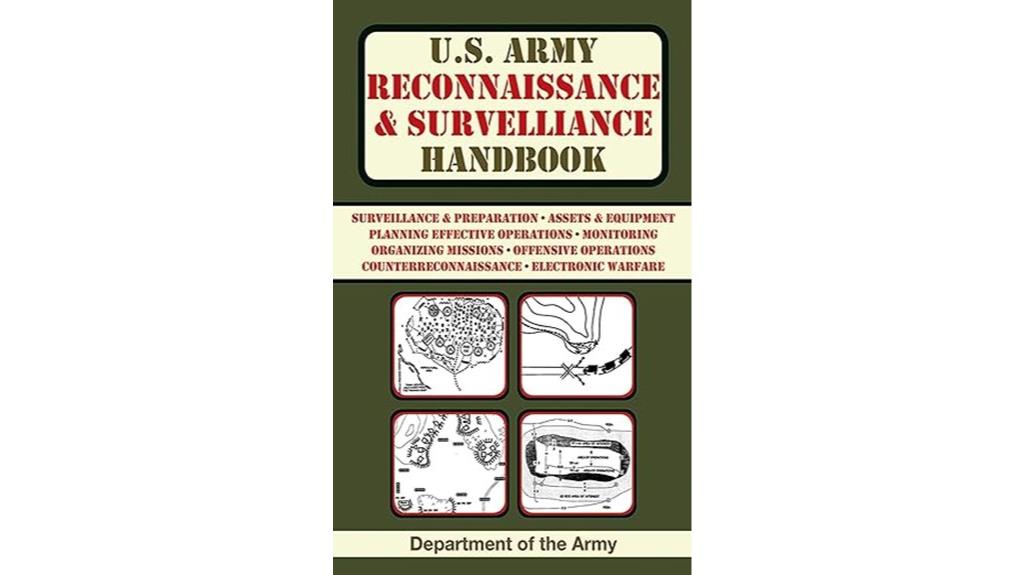
Civilians enthusiastic to deepen their understanding of military operations will find the "U.S. Army Reconnaissance and Surveillance Handbook" quite insightful. This handbook spans 32 chapters, focusing on vital topics like Area Study and OP/LP setup. It's designed for readers with military ties or those sharing knowledge with peers. The information is easy to digest, making it accessible to many. However, some may find it outdated, reflecting lessons from the 1990s. While S2 officers might benefit, others, especially those interested in current recon tactics, may feel it lacks relevance. Overall, it's a mixed bag, yet valuable for foundational understanding.
Best For: Civilians interested in military knowledge, particularly those with ties to the military or looking to share information with peers.
Pros:
- Easy to digest and read, making complex topics more accessible.
- Provides foundational knowledge on key military topics like Area Study and OP/LP setup.
- Useful for S2 officers seeking to understand reconnaissance principles.
Cons:
- Considered outdated, reflecting tactics and lessons from the 1990s.
- Less applicable for those focused on current reconnaissance tactics and training.
- Mixed reviews on engagement, with some finding it boring.
Cyberspies: The Secret History of Surveillance and Digital Espionage
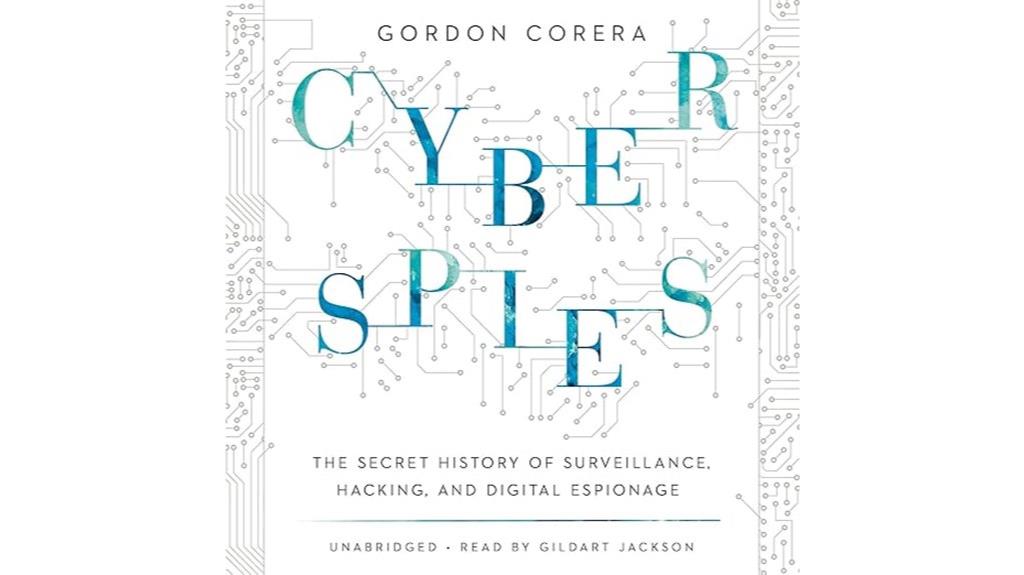
For anyone intrigued by the intricate dance of espionage and technology, *Cyber Spies: The Secret History of Surveillance, Hacking, and Digital Espionage* is a must-read. Gordon Corera expertly chronicles the evolution of spying from WWII to 2015, revealing how methods and goals have transformed alongside technology. He takes us from Bletchley Park's code-breaking triumphs to modern cyber warfare, highlighting significant events like Stuxnet and the Arab Spring. While some critiques note its dry prose, the book remains a well-documented narrative that emphasizes the need for understanding cyber threats and adapting our strategies to protect privacy and security.
Best For: Readers interested in the intersection of technology and espionage, particularly those looking to understand the evolution of digital surveillance.
Pros:
- Well-researched: The book provides a thorough historical account of espionage, backed by extensive documentation.
- Engaging narrative: Despite some critiques, many readers find the storytelling engaging and informative.
- Timely insights: Offers valuable perspectives on current cyber threats and the implications for privacy and security.
Cons:
- Dry prose: Some readers may find the writing style lacking in excitement or engagement.
- Perceived bias: Criticism exists regarding the portrayal of certain entities, which may skew understanding.
- Limited exploration: Some readers suggest a need for broader discussions on ongoing public engagement and policy development.
Cyber Privacy: Who Has Your Data and Why You Should Care
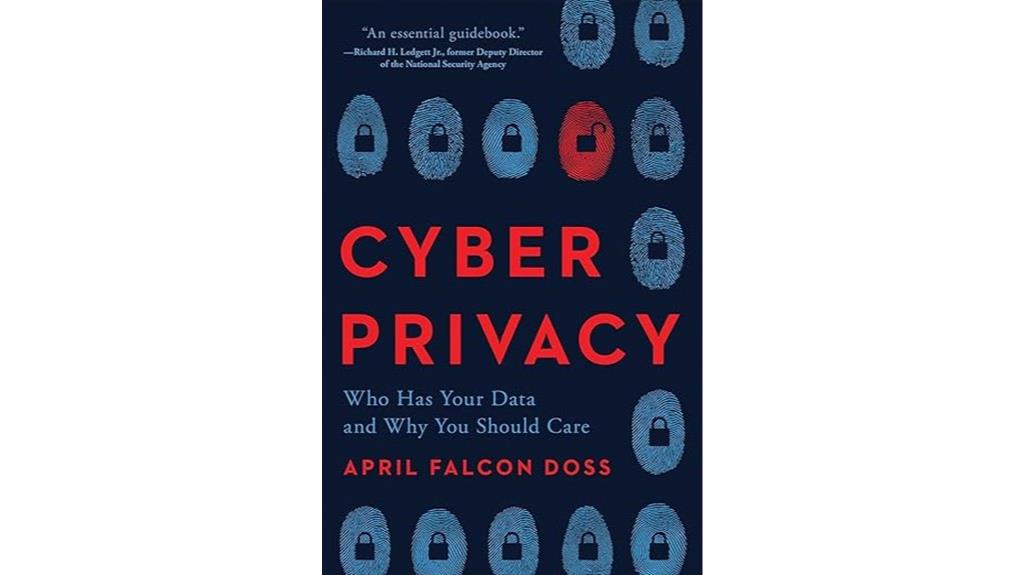
Are you concerned about how your personal information is collected and used? "Cyber Privacy: Who Has Your Data and Why You Should Care" is an essential read for anyone traversing the digital landscape. It dives deep into how corporations and governments gather and utilize our data, especially in the age of Covid-19 and advanced surveillance technologies. I found it eye-opening to learn that private companies often pose a greater threat to our privacy than the government. This book helps clarify the risks of our online behavior and the implications of oversharing, making it a must-read for anyone engaged with technology.
Best For: Individuals seeking to understand the complexities of data privacy and the implications of their online actions.
Pros:
- Informative content that breaks down complex topics related to data privacy in an accessible manner.
- Highlights the greater threat posed by private corporations compared to government surveillance, offering a fresh perspective.
- Discusses the impact of technology on daily life and the consequences of oversharing, making it relevant for all tech users.
Cons:
- Some readers may perceive a bias towards government narratives, potentially limiting the book's objectivity.
- Critiques suggest that it may not fully address counter-arguments regarding the benefits of data collection.
- Limited exploration of alternative viewpoints on cyber privacy compared to other recommended readings.
Surveillance Countermeasures: The Professionals Guide
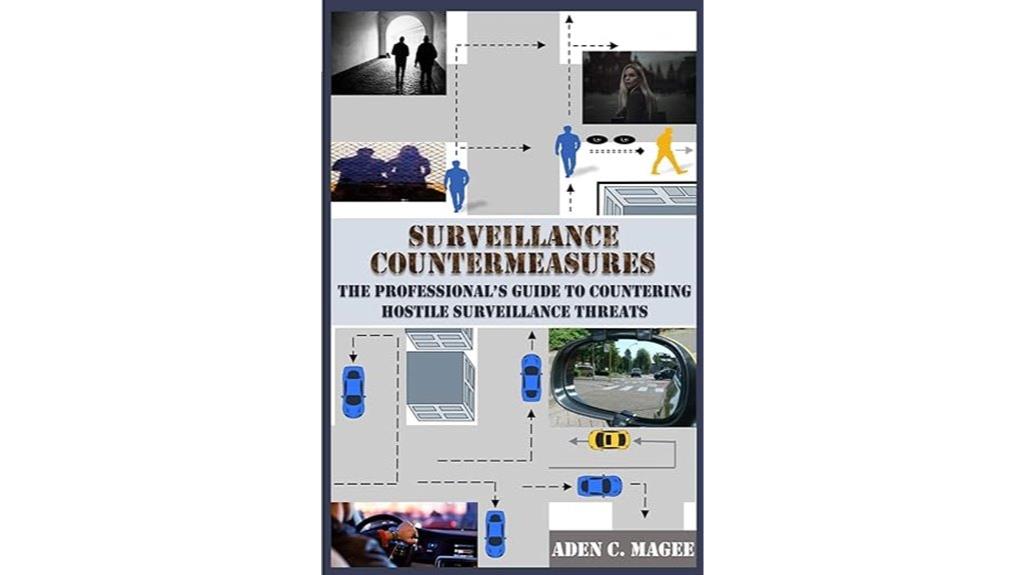
The "Surveillance History Books" is an essential resource for anyone looking to deepen their understanding of countermeasures in surveillance, especially those with a foundational grasp of security concepts. This guide dives into practical techniques, formations, and checklists, but I found the content somewhat basic—perfect for novices, yet lacking for seasoned pros. It emphasizes situational awareness, which I believe is vital for effective personal security. However, it misses specifics on modern issues like mobile phone surveillance and UK police practices. While informative, I was left wanting more advanced strategies to truly counter today's surveillance threats.
Best For: Individuals seeking a basic understanding of surveillance countermeasures, particularly novices in personal security.
Pros:
- Provides a foundational grasp of practical techniques and situational awareness.
- Includes useful formations and checklists that can aid in personal security strategies.
- Emphasizes the importance of environmental measures in countering surveillance threats.
Cons:
- Content may be too basic for seasoned professionals looking for advanced strategies.
- Lacks specifics on modern surveillance issues such as mobile phone tracking and police practices in the UK.
- The structure of the book may lead to reader frustration due to excessive focus on what will be covered rather than direct content.
How Sex Changed the Internet and the Internet Changed Sex
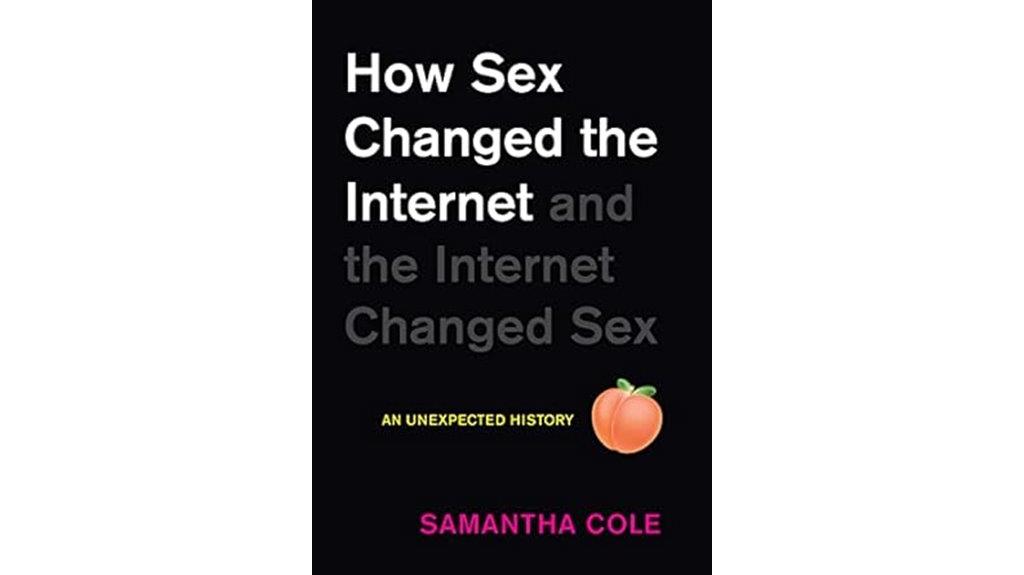
Exploring the intricate relationship between sexuality and technology, "How Sex Changed the Internet and the Internet Changed Sex" by Samantha Cole stands out as a must-read for anyone intrigued by the evolution of online culture. Cole takes us through the historical journey from BBS systems to today's dating apps, showcasing how sex workers lead tech adoption. She highlights the internet's transformation of personal relationships and societal views on sexuality. With engaging storytelling, Cole navigates the complexities of censorship and online expression, making this book both educational and entertaining. It's an eye-opening exploration that reshaped my understanding of digital intimacy.
Best For: Individuals interested in the intersection of technology, culture, and sexuality, as well as those seeking to understand the evolution of online sexual expression.
Pros:
- Well-Researched: Offers insightful historical context and detailed exploration of how technology has shaped sexual identities.
- Engaging Storytelling: Combines humor and smart analysis, making complex topics accessible and enjoyable to read.
- Thought-Provoking: Challenges readers to reflect on the implications of online sexual content and the impact of censorship.
Cons:
- Complex Topics: Some readers may find the discussions on censorship and trafficking overwhelming or difficult to navigate.
- Limited Focus on Certain Issues: The book may not delve deeply enough into all aspects of online trafficking and its consequences.
- Potentially Controversial Opinions: Some views presented may provoke discomfort or disagreement among readers with differing perspectives on sexuality and technology.
Permanent Record
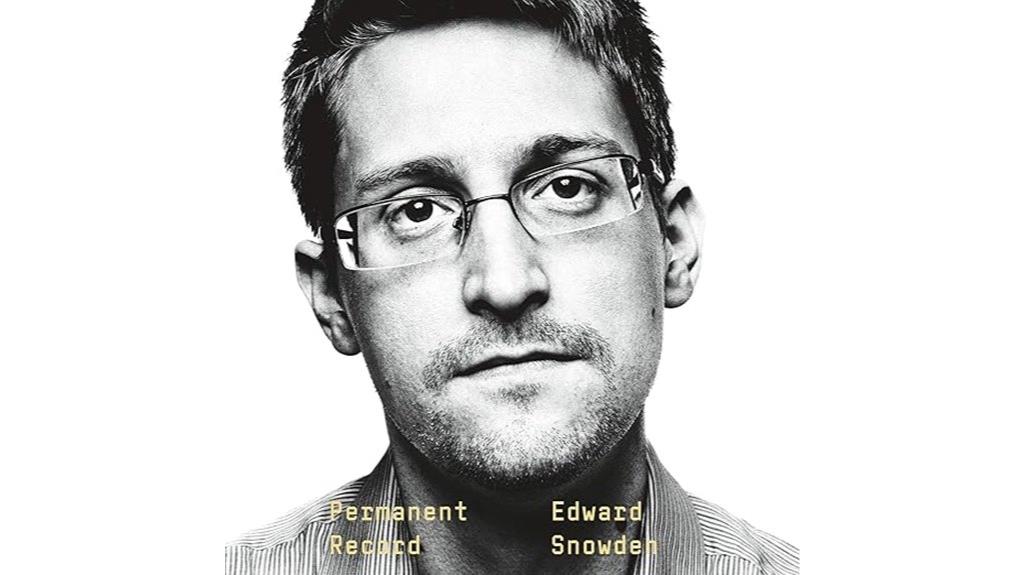
For anyone intrigued by the complex interplay between technology and privacy, "Permanent Record" stands out as an essential read. Edward Snowden's journey reveals how surveillance technology evolved from the 1960s, culminating in the NSA's vast data collection. I found his moral struggle compelling; faced with the reality of mass surveillance, he chose to expose the truth, despite knowing the risks. His revelations about government overreach challenge our understanding of privacy. Living in exile adds a personal layer to his story, making it not just about data, but also about the human cost of whistleblowing. This book is a wake-up call.
Best For: Readers interested in technology, privacy issues, and the ethical implications of government surveillance will find "Permanent Record" particularly enlightening.
Pros:
- Insightful Exploration: Provides a detailed account of the evolution of surveillance technology and its impact on privacy.
- Compelling Narrative: Snowden's personal story adds emotional depth to the subject, making complex issues accessible.
- Awakens Awareness: Challenges readers to reconsider their understanding of privacy and government overreach in the digital age.
Cons:
- Controversial Perspective: Some may find Snowden's actions divisive or disagree with his methods of whistleblowing.
- Technical Complexity: Readers unfamiliar with technology may struggle with some of the technical details discussed.
- Ongoing Debate: The book may not provide clear solutions to the issues raised, leaving readers with more questions than answers.
We Have Been Harmonized: Life in Chinas Surveillance State

If you're curious about the intersection of technology and totalitarianism, "We Have Been Harmonized: Life in China's Surveillance State" is an eye-opening read. Kai Strittmatter, a seasoned journalist, reveals how the Chinese Communist Party employs advanced technologies like facial recognition and AI to monitor and control citizens. The book highlights the alarming parallels between China's surveillance state and emerging trends in the U.S. Strittmatter's gripping narrative serves as a cautionary tale, urging us to recognize the potential for similar authoritarian methods creeping into our societies. His powerful reporting provides essential insights for anyone concerned about the future of freedom and privacy.
Best For: Individuals interested in understanding the implications of surveillance and totalitarianism in contemporary society, particularly in relation to China and the West.
Pros:
- In-depth analysis of the Chinese Communist Party's use of technology for social control, providing valuable insights into modern authoritarian practices.
- Compelling narrative that draws alarming parallels between China's surveillance state and emerging trends in Western societies, making it relevant for global audiences.
- Thorough investigative journalism that highlights the dangers of unchecked governmental power and the erosion of individual freedoms.
Cons:
- Potential political bias in some of Strittmatter's commentary, which may detract from the objectivity of the analysis for certain readers.
- Lack of nuanced discussion regarding the complexities of China's political landscape and the diverse perceptions of its citizens, which could lead to oversimplification.
- Limited exploration of alternative viewpoints or responses from Chinese citizens, potentially missing a broader understanding of the societal impact of surveillance.
The Known Citizen: A History of Privacy in Modern America

Privacy enthusiasts and professionals in data ethics will find "The Known Citizen: A History of Privacy in Modern America" to be an essential resource. This book dives deep into how privacy has evolved in the U.S., intertwining historical events and key court cases like Griswold v. Connecticut. I appreciate the thorough research across its 369 pages, even if some chapters feel more engaging than others. The author expertly connects past privacy issues to today's challenges, from social media to data surveillance. It raises crucial questions about our right to privacy in an increasingly monitored world, leaving me reflecting on the implications for the future.
Best For: Privacy enthusiasts, data ethics professionals, and students seeking a comprehensive understanding of the evolution of privacy in America.
Pros:
- Thoroughly researched: The book contains extensive references and notes, providing a solid academic foundation.
- Engaging narrative: Despite some uneven chapters, the overall storytelling captures the reader's interest.
- Historical relevance: Connects past events and court cases to contemporary privacy issues, enhancing understanding of current challenges.
Cons:
- Flow disruption: The use of extensive primary source quotes can interrupt the reading experience.
- Variable chapter strength: Some chapters may be less engaging than others, affecting overall cohesion.
- Lack of specific policy recommendations: The book focuses more on historical context than on outlining concrete solutions for modern privacy issues.
The Listeners: A History of Wiretapping in the United States
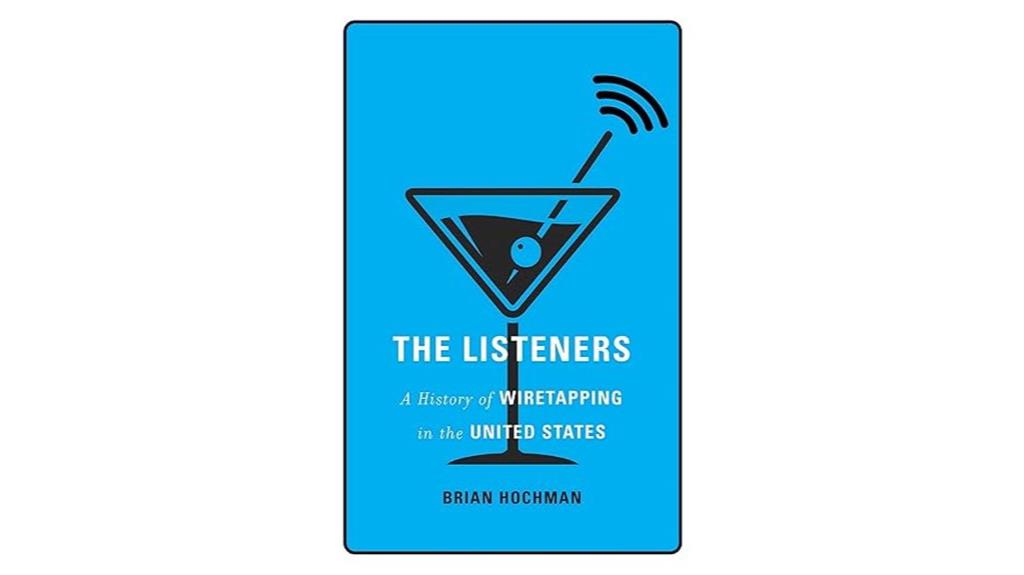
"The Listeners: A History of Wiretapping in the United States" stands out as an essential read for anyone intrigued by the intricate relationship between surveillance and civil liberties. Brian Hochman skillfully traces wiretapping's journey from the Civil War to modern times, shedding light on landmark court cases that shaped our legal landscape. His engaging narrative, filled with fascinating anecdotes, makes complex legal concepts accessible. While some critiques point to potential biases and abrupt style shifts, the book serves as a solid foundation, urging readers to dig deeper into wiretapping's implications, especially in light of post-9/11 legislation like the USA Patriot Act.
Best For: Individuals interested in the intersection of surveillance practices and civil liberties, particularly those seeking a historical overview of wiretapping in the U.S.
Pros:
- Comprehensive Overview: Provides a thorough survey of wiretapping history, enhancing understanding of its evolution over time.
- Engaging Narrative: Combines legal analysis with storytelling, making complex concepts accessible and interesting.
- Rich Historical Context: Features significant court cases and anecdotes that enrich the understanding of wiretapping's impact on society.
Cons:
- Potential Biases: Some readers may find the author's personal perspectives influence their conclusions and judgments.
- Abrupt Style Transitions: The shifts between narrative styles can be jarring for some readers, affecting the overall flow.
- Limited Post-9/11 Analysis: The conclusion of the book precedes the USA Patriot Act, leaving out discussions on more recent legislation and its implications.
Factors to Consider When Choosing Surveillance History Books

When I choose a surveillance history book, I consider a few key factors that really matter. The author's expertise and the book's historical relevance can make a huge difference in understanding the topic. Plus, I look for a writing style that keeps me engaged while providing a thorough analysis of key events.
Historical Relevance and Context
While exploring surveillance history books, I find it essential to contemplate their historical relevance and context. These books often trace the evolution of surveillance technologies, from wiretapping during the Civil War to code-breaking at Bletchley Park in WWII. Understanding the legal frameworks and societal attitudes, highlighted by pivotal cases like Katz v. US and legislation such as the USA Patriot Act, adds depth to our comprehension. Additionally, the interplay between technological advancements and their surveillance applications reveals how innovations like the internet have facilitated unprecedented mass surveillance. Delving into the historical roots of consumer surveillance, like credit reporting bureaus, sheds light on ongoing data privacy concerns. Recognizing the ideological contexts helps us understand how surveillance practices evolve in different political environments.
Author's Expertise and Credibility
Choosing surveillance history books requires careful consideration of the author's expertise and credibility, as these factors can greatly influence the quality of the insights presented. I always look for authors with a solid background in journalism or academia, as they often deliver well-researched narratives. Books by individuals with firsthand intelligence experience, like Edward Snowden's "Permanent Record," provide unique perspectives that enrich understanding. Authors who have lived in surveillance-heavy regions, such as Kai Strittmatter in China, offer critical analyses based on personal observations. Established historians or social scientists, like Josh Lauer, help frame the historical context necessary for grasping the evolution of surveillance practices. Finally, I pay attention to the sources they use, as credible authors typically incorporate primary documents and legal cases.
Writing Style and Engagement
Understanding the author's expertise and credibility sets the stage for evaluating the writing style and engagement of surveillance history books. I've found that engaging writing styles—especially those blending humor with insightful analysis—make complex topics like surveillance much easier to digest. Clarity and simplicity are key; they help maintain my interest while unpacking intricate subjects like data privacy. I also appreciate the integration of visual storytelling, like in graphic novels, which makes historical content relatable. A well-structured narrative that connects past practices to contemporary issues enhances my understanding of surveillance's societal implications. Finally, authors who share personal anecdotes alongside facts create an immersive experience that encourages deeper reflection on the material, making the read not just informative, but enjoyable.
Depth of Analysis Provided
When I explore surveillance history books, I find that the depth of analysis greatly influences my reading experience. I look for works that provide rich historical context, like "Creditworthy," which traces the evolution of credit reporting and its impact on modern issues. I appreciate books that investigate key legal cases, such as "The Listeners," which highlights how landmark court rulings shaped surveillance laws. Additionally, I favor thorough analyses that connect technological advancements to societal effects, like in "The Age of Surveillance Capitalism." Personal narratives, as seen in "Permanent Record," also enhance my understanding of moral dilemmas. Finally, I value a balance between narrative style and factual accuracy, as demonstrated in "Verax," which makes complex issues accessible.
Coverage of Key Events
While diving into surveillance history books, I focus on their coverage of key events that have shaped our understanding of surveillance today. I look for discussions on pivotal moments like the establishment of ARPANET, which set the stage for modern internet surveillance. Edward Snowden's revelations about NSA practices are vital, too, as they reveal the complexities of privacy in our digital age. I also consider books that analyze landmark court cases like Katz v. United States and Olmstead v. U.S., which reflect the evolving legal landscape. Additionally, narratives detailing technological advancements, major data breaches, and the rise of social credit systems in China connect historical events to present-day surveillance issues, enriching my overall perspective.
Contemporary Implications Discussed
As I explore contemporary implications in surveillance history books, I notice that many authors urge readers to reflect on the urgent need for protective measures regarding individual freedoms and privacy. For instance, "The Age of Surveillance Capitalism" emphasizes the necessity for legislation to safeguard our rights in a data-driven world. Similarly, "Verax" raises ethical concerns about government transparency in drone warfare, highlighting the role of whistleblowing. In "We Have Been Harmonized," parallels drawn between China's surveillance state and Western trends serve as a warning against normalizing totalitarian methods. Finally, "The Known Citizen" illustrates how privacy debates evolve, especially with social media's rise. These texts collectively underscore the importance of regulatory frameworks to protect consumer data amid increasing corporate surveillance.
Visual and Illustrative Elements
The importance of visual and illustrative elements in surveillance history books can't be overstated. They enhance our understanding of complex subjects and make the material more engaging. For instance, graphic novels like "Verax" use caricature illustrations to simplify dense information, keeping readers interested. Historical photographs, charts, and diagrams in texts like the "Handbook of Surveillance Technologies" offer essential context, showcasing the evolution of surveillance devices. Illustrated timelines and infographics help summarize key events, making it easier to grasp the chronological progression of surveillance practices. Effective visual storytelling, as seen in "How Sex Changed the Internet," complements the narrative and provides a deeper insight into the interplay between technology and societal changes. These elements truly elevate the reading experience.
Frequently Asked Questions
What Are the Key Themes Explored in Surveillance History Books?
When I immerse myself in surveillance history books, I often notice key themes like power dynamics, privacy erosion, and the ethical implications of monitoring. These texts explore how surveillance technologies evolve alongside societal fears and governmental control. They also highlight resistance movements and the struggle for civil liberties. I find it fascinating how these themes reflect broader issues of trust, transparency, and the balance between security and individual freedoms in our modern world.
How Can Surveillance History Books Inform Current Privacy Debates?
Imagine a shadow lurking behind every digital interaction, whispering secrets of our past. Surveillance history books illuminate how societies have navigated the delicate dance between safety and privacy. They reveal patterns of power and control, making me realize that today's debates aren't new. By understanding past mistakes and triumphs, I can better advocate for my privacy rights and challenge the surveillance norms creeping into our lives. Knowledge truly empowers our choices.
Are There Notable Authors Specializing in Surveillance History Literature?
I've come across several notable authors specializing in surveillance history literature. One that stands out is David Lyon, who offers deep insights into surveillance society. Another is Edward Snowden, whose writings provide a firsthand perspective on modern surveillance issues. Then there's Shoshana Zuboff, whose work on surveillance capitalism illuminates how technology shapes our lives. Their contributions help me understand the complexities of surveillance and its implications for privacy today.
What Impact Do These Books Have on Public Awareness of Surveillance?
I've noticed that books on surveillance history really open my eyes to the extent of monitoring in our lives. They highlight how surveillance shapes society and influences our freedoms, making me more aware of my privacy. These works encourage critical thinking about technology and government power, sparking conversations that we desperately need. By shedding light on past practices, they empower us to question current policies and advocate for better protections in the future.
How Do Surveillance History Books Vary in Perspective Across Different Cultures?
When I explore surveillance history books, I notice they vary widely in perspective across cultures. For instance, Western texts often focus on state control and individual privacy, while others from authoritarian regimes might emphasize security and loyalty. Each culture's unique experiences shape its narrative, revealing how surveillance is perceived differently. This diversity in viewpoints deepens my understanding of surveillance's role globally, highlighting the complexities of monitoring and its implications on society.
Conclusion
So, there you have it—14 books that'll make you question every glance over your shoulder and every click online. Who knew our lives were fundamentally a reality show for the surveillance state? But hey, knowledge is power, right? If you can't escape the watchful eyes, at least arm yourself with a book or two. After all, what's better than being spied on while you're cozied up with a good read about just how deeply you're being monitored?









